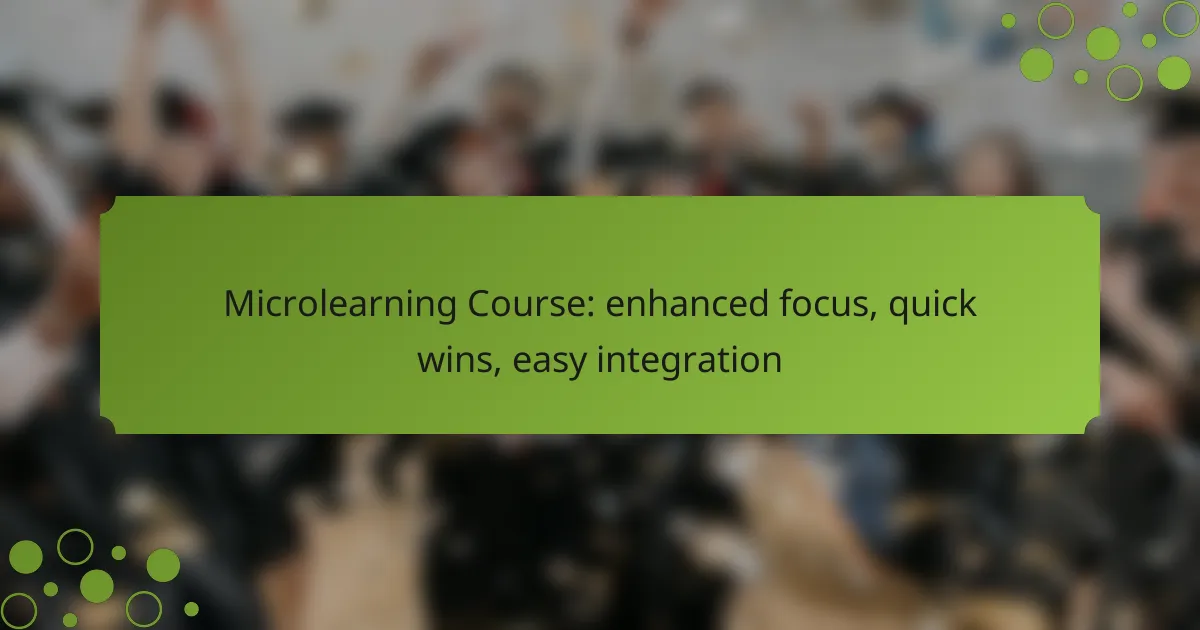This workshop course is designed to enhance collaborative skills through a blend of practical knowledge and peer feedback. Participants will engage in interactive exercises that promote teamwork and effective communication, allowing them to apply concepts in real-time. By fostering an environment of constructive criticism, this course aims to cultivate essential competencies for successful collaboration.

What are effective workshop courses for collaborative skills in Canada?
Effective workshop courses for collaborative skills in Canada focus on enhancing teamwork, communication, and peer feedback. These courses often combine practical exercises with theoretical knowledge to help participants develop essential collaborative competencies.
Skillshare collaborative workshops
Skillshare offers a variety of collaborative workshops designed to foster teamwork and creative problem-solving. These workshops typically feature hands-on projects where participants work together to achieve common goals, enhancing their ability to communicate and collaborate effectively.
When selecting a Skillshare workshop, consider the specific skills you want to develop, such as brainstorming techniques or conflict resolution. Many workshops are project-based, allowing you to apply what you learn in real-time, which can be particularly beneficial for group dynamics.
Coursera peer feedback courses
Coursera provides peer feedback courses that emphasize the importance of constructive criticism in collaborative environments. These courses often include assignments where participants review each other’s work, promoting a culture of open communication and continuous improvement.
Look for courses that include a variety of feedback techniques, such as the “sandwich” method, which balances positive comments with constructive suggestions. Engaging with peers in this way can significantly enhance your ability to give and receive feedback effectively.
Udemy teamwork training
Udemy features numerous teamwork training courses that cover essential collaborative skills, such as leadership, negotiation, and effective communication. These courses often include video lectures, quizzes, and practical exercises to reinforce learning.
When choosing a Udemy course, check for user ratings and reviews to ensure the content meets your needs. Many courses are self-paced, allowing you to learn at your convenience while still gaining valuable insights into effective teamwork strategies.

How can practical knowledge be gained in workshop courses?
Practical knowledge in workshop courses can be gained through interactive and experiential learning methods. These approaches allow participants to apply concepts in real-time, enhancing their understanding and skills.
Hands-on projects
Hands-on projects are essential for developing practical skills in workshop courses. Participants engage in tasks that mimic real-world scenarios, allowing them to apply theoretical knowledge directly. For example, a workshop on digital marketing might include creating a mock campaign, enabling learners to practice strategy formulation and execution.
When designing hands-on projects, it’s crucial to ensure they are relevant and challenging enough to stimulate learning. Aim for projects that require collaboration and problem-solving, as these elements foster deeper understanding and retention of knowledge.
Real-world case studies
Real-world case studies provide valuable insights into practical applications of concepts learned in workshops. Analyzing actual business scenarios helps participants understand the complexities and nuances of decision-making in various contexts. For instance, a case study on a successful startup can illustrate effective marketing strategies and operational challenges.
To maximize the learning experience, choose case studies that are current and relevant to the participants’ interests or industries. Encourage discussions around these cases to foster critical thinking and peer feedback, enhancing the learning process.
Group exercises
Group exercises are a powerful way to develop collaborative skills and practical knowledge in workshop settings. These activities encourage participants to work together, share ideas, and solve problems collectively. For example, a group brainstorming session can lead to innovative solutions and a deeper understanding of the subject matter.
When implementing group exercises, consider the diversity of participants’ backgrounds and experiences. This diversity can enrich discussions and lead to more comprehensive learning outcomes. Ensure that each group has clear objectives and roles to keep the exercises focused and productive.

What role does peer feedback play in workshop courses?
Peer feedback is essential in workshop courses as it fosters collaborative skills and enhances practical knowledge. By allowing participants to receive and give constructive criticism, it creates an environment conducive to learning and improvement.
Enhances learning outcomes
Peer feedback significantly enhances learning outcomes by providing participants with diverse insights into their work. When learners evaluate each other’s contributions, they can identify strengths and weaknesses that may not be apparent to the individual alone.
This process encourages deeper engagement with the material, as students must analyze and articulate their thoughts clearly. For example, in a writing workshop, receiving feedback on clarity and structure can lead to improved writing skills over time.
Encourages diverse perspectives
Incorporating peer feedback encourages diverse perspectives, enriching the learning experience. Participants from different backgrounds and experiences can offer unique viewpoints that challenge conventional thinking and inspire new ideas.
This diversity can be particularly beneficial in creative workshops, where varied interpretations can lead to innovative solutions. For instance, a group project may benefit from feedback that highlights cultural nuances, resulting in a more comprehensive final product.
Builds confidence
Peer feedback plays a crucial role in building confidence among participants. When individuals receive positive reinforcement and constructive criticism from their peers, they are more likely to feel validated in their abilities.
Moreover, engaging in the feedback process allows learners to practice giving and receiving criticism, which can reduce anxiety in professional settings. For example, a participant who regularly provides feedback may become more comfortable sharing their ideas in larger forums, ultimately enhancing their overall communication skills.

What prerequisites are needed for effective workshop participation?
Effective workshop participation requires basic communication skills and a willingness to collaborate. These prerequisites ensure that participants can engage meaningfully with peers and contribute to the collective learning experience.
Basic communication skills
Basic communication skills are essential for expressing ideas clearly and understanding others. Participants should be able to articulate their thoughts, ask questions, and provide feedback in a constructive manner.
To enhance communication, consider practicing active listening, which involves fully concentrating on the speaker, understanding their message, and responding thoughtfully. This skill helps to foster an open environment where everyone feels valued and heard.
Willingness to collaborate
A willingness to collaborate is crucial for effective teamwork in workshops. This means being open to sharing ideas, accepting diverse perspectives, and working towards common goals with fellow participants.
To cultivate a collaborative mindset, approach group activities with a positive attitude and a readiness to compromise. Avoid dominating discussions and instead encourage quieter members to share their insights, creating a more inclusive atmosphere.

How to choose the right workshop course for collaborative skills?
Selecting the right workshop course for collaborative skills involves evaluating the course content, instructor experience, and participant reviews. These factors help ensure the course meets your specific needs and fosters effective teamwork.
Assess course content
Examine the curriculum to ensure it covers essential collaborative skills such as communication, conflict resolution, and group decision-making. Look for courses that offer practical exercises and real-world applications to reinforce learning.
Consider whether the course includes peer feedback mechanisms, as these can enhance the collaborative experience. A well-structured syllabus should outline specific topics and skills to be developed, providing clarity on what you will gain.
Evaluate instructor experience
The instructor’s background significantly influences the quality of the workshop. Check their qualifications, including relevant certifications and experience in teaching collaborative skills. An instructor with a strong professional background in teamwork can provide valuable insights.
Look for instructors who have facilitated similar workshops successfully. Their ability to engage participants and manage group dynamics is crucial for a productive learning environment.
Check participant reviews
Reading reviews from past participants can provide insight into the workshop’s effectiveness. Look for feedback on the course content, instructor engagement, and overall satisfaction. Positive reviews often highlight practical applications and the immediate benefits of the skills learned.
Be cautious of overly positive or negative reviews; aim for a balanced perspective. Consider the number of reviews and the context in which the course is offered, as this can affect the relevance of the feedback to your situation.

What are the costs associated with workshop courses in Canada?
The costs of workshop courses in Canada can vary significantly based on factors such as the course content, duration, and location. Generally, participants should expect to pay anywhere from a few hundred to several thousand Canadian dollars depending on these variables.
Average course fees
On average, workshop course fees in Canada range from CAD 200 to CAD 2,000. Shorter workshops, typically lasting a day or two, may cost between CAD 200 and CAD 600, while more extensive courses that span several weeks can reach CAD 1,000 to CAD 2,000 or more. It’s essential to research specific courses to understand their pricing structures.
Some institutions may also charge additional fees for materials or certification, which can add to the overall cost. Always inquire about these potential extras when evaluating workshop options.
Potential discounts for groups
Many workshop providers in Canada offer discounts for groups, making it more affordable for organizations to enroll multiple participants. Discounts can range from 10% to 30% off the total fees, depending on the number of attendees and the provider’s policies.
To take advantage of these group discounts, it’s advisable to contact the course provider directly. They may have specific requirements or offer tailored packages for corporate training or educational institutions.



